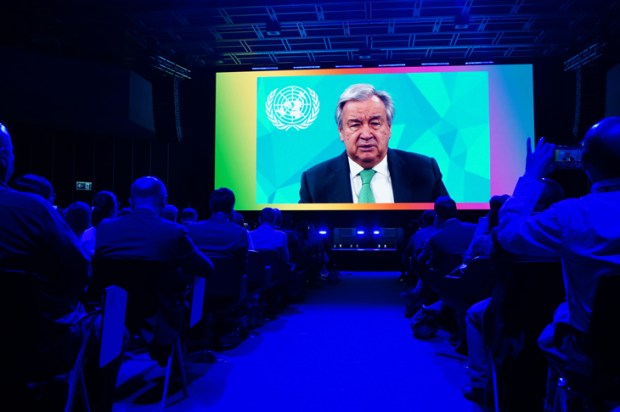Degrading tribalism
Sir: It’s hard to ignore the irony that a week after my receiving the praise of Andrew Neil (Diary, 3 May) who is, I think it’s fair to say, someone ‘from the centre-right spectrum’, you have published an editorial saying that any such person on Q&A ‘is paraded in front of a salivating, jeering audience to be mocked as a freak’ (Leading article, 10 May). Such palpable nonsense simply cannot be ignored.
You can add to that irony the fact that you also have a diary piece in the same edition from Brendan O’Neill, referring to his own appearance on the show. Oddly, I don’t recall Mr O’Neill being mocked as a freak either but then again, perhaps you regard him (being a Marxist) as someone from the extreme Left, who knows? To compound the irony, within the same edition there is a piece from Rod Liddle bemoaning the loss of Jeremy Paxman from the BBC line-up (‘With Paxman gone, there are even fewer reasons to like the BBC,’ 10 May). Liddle makes the point that Paxman’s interrogative interviewing style was: ‘a reaction to a development in modern politics which really did have a corrosive effect upon democracy, i.e. the rise of spin-doctoring’. I must say we are not unfamiliar with those dark arts here in Australia.
I mention Liddle because of the further claim in your editorial that I was somehow to blame for the brief student demonstration which occurred on Q&A because I had, earlier in the show, interrupted Christopher Pyne (rather ‘leapt down his throat’ to use the words in the editorial). To be clear, I did interrupt Mr Pyne’s answer when, in answering a question from a rather brave 16-year-old, the education minister referred to a programme designed to help young people with serious personal problems in their transition from school to work as a ‘landmine’. At the time it seemed a very odd, even insensitive, comparison and I interrupted his flow to remark on it.
To infer from that interruption blame for a secretly planned demonstration by a group of students and then suggest that the show should now be cut from the ABC’s budget is extraordinary and suggests that the kind of degrading tribalism that Andrew Neil found prevalent in Australian politics is sadly evident in your own publication.
Tony Jones
Presenter, ABC’s Q&A, Lateline
Ultimo, Sydney
Trust renewables
Sir: Your editorial (‘Green and unpleasant’, 3 May) accused the National Trust of jumping ‘aboard the climate change bandwagon’ and performing a ‘double backflip’ on wind energy and shale gas. Not true. We have long been worried about the impact that climate change is having on our properties. Sixty per cent of the 740 miles of coastline we look after is at risk from erosion as sea levels rise, and rising average temperatures are affecting the species we care for on our land. That’s why we are considering investing £35 million in renewable energy sources, so that by 2020 the Trust will only get 50 per cent of our energy from fossil fuels.
We recently published policy guidelines to ensure the environmental impacts of fracking are minimised. As an organisation looking after some of the country’s most beautiful countryside on behalf of the public, we also have to consider the aesthetic impacts of energy infrastructure. Until we can be sure that these impacts are dealt with, we would not allow fracking on our land. That is also why we will object to large-scale renewable developments — including wind farms — which we believe affect the historic significance or natural beauty of our properties.
It is not for us to tell government what their energy mix should be, but we won’t shy away from the difficult issues involved in protecting the places we look after on behalf of the nation from the unprecedented threat of a warming climate.
Dame Helen Ghosh
Director general, The National Trust
London SW1
Damage done
Sir: It would appear laudable for Robin Hanbury-Tenison to have mortgaged his future for what he believes is the right thing to do (Letters, 10 May), but nothing can compensate for the substantial damage caused to the environment by the manufacture and installation of his wind turbine, the manufacture and installation of his field array of photovoltaic panels and the manufacture and production of his electric van.
Bruce Kennedy
London W4
Disgruntled youths
Sir: As young journalists embarking on a project about our generation in Europe, we feel inclined to respond to Mr Delingpole’s diatribe on ‘why the young never had it so good’ (10 May) and ask him to rejoin us disgruntled youths over in the realists’ camp. Some very simple points should show why using only selected statistics obscures the big picture. While wages have climbed 62 per cent in just 25 years, they have been falling since 2009, the year many of us ‘millennials’ entered the job market. Throw in underemployment and the cost of living, especially in the capital, and you would see that financially we’re being taken for a ride.
What’s on offer instead, we’re told, is ‘free stuff’ on the internet, such as Spotify and Tinder. Is he really suggesting that the existence of such sites is a substitute for a stable future?
The biggest omission of all: not once in the article does the author mention the word ‘debt’. We know it’s a dirty word, but it’s also one of our generation’s greatest concerns. On leaving uni, we are faced with the prospect of a lifetime spent paying for degrees that amount to very, very little.
So James, please. Admit your errors and return to us, all is forgiven.
Yiannis Baboulias, Jamie Mackay,
Niki Seth-Smith for the
Precarious Europe project,
Hackney, London
Got something to add? Join the discussion and comment below.
Write to us
The Spectator, 22 Old Queen Street,
London SW1H 9HP
letters@spectator.co.uk
You might disagree with half of it, but you’ll enjoy reading all of it. Try your first month for free, then just $2 a week for the remainder of your first year.











